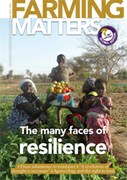Members of the AgriCultures Network are working together to advance family farming and agroecology by drawing lessons from farmers’ fields, sharing knowledge and working with social movements for policy change. Read our latest news.
Cultivating diversity in advocacy
Using the last edition of the magazine as a vehicle, many network members engaged policy makers and academics in debates on the importance of agrobiodiversity in the past two months. IED Afrique organised a seminar on agrobiodiversity in Dakar and a field visit, in partnership with the Senegalese National Coordinating Committee for the International Year of Family Farming. This brought together 50 participants representing NGOs, farmer organisations, government departments, the media, etc.
AS-PTA in Brazil presented the latest issue of their magazine during a high level meeting related to the new National Plan on Agroecology and Organic Production in which agrobiodiversity is one of the main thematic areas. The AME-Foundation in India organised a half day debate, with presentations by some of the authors in the LEISA magazine. ILEIA in the Netherlands launched the magazine at a consultation about food security and agroecology at the Dutch Ministry of Foreign Affairs in the Hague. ETC Andes-Peru organised a roundtable event in cooperation with UNAM University and the University of La Molina.
National Agroecology Encounter in Brazil
While the rest of Brazil is getting ready for the FIFA World Cup, the Brazilian agroecology movement held its third National Agroecology Encounter in Juazeiro on 16-19 May 2014. AS-PTA was one of the organisers, and the Encounter was an explosion of colours, energy, diversity, determination and friendship.
More than 2000 farmers, civil society organisations, students, scientists and government officials gathered to exchange experiences in building an agroecological ‘model’ of development. Seventy percent of the participants were farmers, and half of them were women. AS-PTA also hosted an international panel discussion with a presentation by ILEIA around the slogan ‘No family farming without agroecology’.
Highlights included the 14 parallel sessions in which people from different territories of Brazil shared their testimonies of struggles, intensive learning, solidarity and achievements. Each group presented their stories using many inventive and artistic means. And visual artists captured the essence in a series of beautiful posters that visualised the essence of these rich territorial learning processes.
Presentations built on the ‘agroecological cultural caravans’ which had been travelling throughout the country during the past six months. Hundreds of communities that took part in these caravans sent representatives to share their experiences in the Encounter, expressing that the only way forward in agriculture is one that respects nature, people, seeds, health – life. Together they will continue to fight for their right to practice agroecological farming.
Documenting the IYFF
As the implementing agency of the International Year of Family Farming (IYFF 2014), the Food and Agriculture Organization of the United Nations (FAO) is supporting the AgriCultures Network to systematise the main messages and recommendations coming out of regional conferences and dialogues around the world.
Halfway through the year, it is becoming increasingly evident that farmer organisations find that, as formulated by European civil society, “the celebration of the IYFF directly contrasts policies imposed on a global scale, which do not recognise the fundamental role played by the social model of peasant production in terms of food, employment and respect for nature.” In Africa, civil society noted the “failure of mechanisms and financing tools tailored to the needs and realities of family farms”. Asian civil society calls upon the FAO to “continue dialogue on the concept of family farming” and to “initiate policies and programmes that serve small food producers and their communities.”
The AgriCultures Network will compile the main messages of the IYFF into a multimedia publication to be presented in four languages at the IYFF closing ceremony in New York, in December 2014.
Photo competition: more than 1300 entries
By the deadline, we had received in excess of 1300 photos in the family farming photo competition. We are very grateful to all the photographers and participants for such an impressive response.
During June, an international jury of farmers and artists will select their top choices for each continent. Between 1 July and 31 August, the public will also be able to vote for their favourite photos. Winners will receive a cash prize and the best photos will be published as part of a 2015 family farming calendar.

